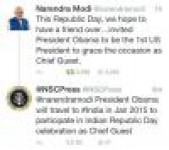Party poopers?
Modi's Obama master stroke left some editorialists disconcerted.
They seemed uncertain how to strike the right note, says DARIUS NAKHOONWALA (Pix: Obama~s reply to Modi on Twitter).

You don’t say!
Darius Nakhoonwala
Once again last week, Prime Minister Narendra Modi had editorialists scurrying about like startled hens in a coop because he pulled off another coup. President Barack Obama of the United States of America, the most powerful country on earth with the one of the weakest heads of government in the world, agreed to be chief guest at India’s Republic Day function in 2015.
The BJP was cock-a-hoop. The government looked coyly smug. The Congress was gob-smacked, as was the rest of the opposition. Twitter, as they say now, was agog with excitement.
But it was the dear editors who appeared to be thrown completely off balance. They managed a squawk only after three days and some, like the HT, Telegraph and the Indian Express, didn’t even manage that.
The Pioneer, which is a BJP supporter, almost burst into full-throated song. This, it said “reflects positively on the personal equation that the two leaders have come to share in a short period of time, and signals a significant improvement in bilateral ties... The sheer symbolic meaning of this visit outweighs any criticism of it being low on ‘substance’... It then pointed out how bad things had become after the Devyani Khobragade episode, how “the relationship had become brittle and listless” etc. Now all would be well. Modi had worked his magic. A little restraint on the paper’s part, I thought, would have worked better.
The Hindu was more cautious. The “acceptance signifies a much larger move on the world stage, a “coming out” of India and the US with the ties they now share” and that perhaps mutual concerns about each other’s intentions “are now in the past, put aside by the Modi government as it embarks on a new course of (foreign) relations... It may be in reaction to these developments that two other significant moves have been seen in India’s neighbourhood - the recent reach out by China to Sri Lanka, the Maldives and Afghanistan, and by Russia to Pakistan with a new defence cooperation agreement.”
Then, forgetting that China and Russian had acted well before the invitation was accepted, the paper made a mistake. It said, “the larger meaning of President Obama’s forthcoming visit has clearly not gone unnoticed.”
The Times of India said: “The signal sent by the R-Day invitation is even more important as Modi was denied a US visa for long... Modi’s diplomatic coup signalled the final ending of its pariah status brought about first by non-alignment and then its nuclear intransigence.”
Then it asked a pointless question: “At the beginning of his tenure, Mr Modi seemed much more comfortable with China and Japan, as economic and political interlocutors. Are signs of a change in this attitude visible - perhaps given China's unwillingness to engage in detente and Japan's sudden political-economic crisis?”
The Economic Times was the only paper to get to the nub of it. It called the acceptance of the invitation an “unqualified diplomatic success for the Narendra Modi government” because “India’s ambition to create a significant defence industry faces several hurdles, including continued exclusion from the Australia Group, the Wassenar Arrangement and the Missile Technology Control Regime, dual-use technology control regimes alongside the Nuclear Supplier’s Group. Washington has to use its good offices to end this exclusion, which would complete the process that began with the nuclear deal.”
Business Standard, which of late has tended to continually carp, was surprisingly positive. It said, the acceptance was “in many ways a notable landmark... a reminder that there is now a strong bipartisan consensus to end that mistrust.” And I thought to myself, perhaps Business Standard should do the same as well.
Such articles are only possible because of your support. Help the Hoot. The Hoot is an independent initiative of the Media Foundation and requires funds for independent media monitoring. Please support us. Every rupee helps.
Subscribe To The Newsletter






